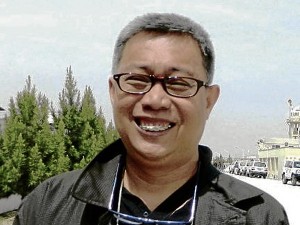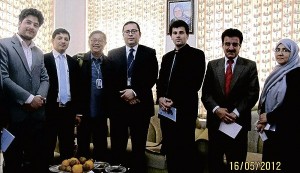In war-torn Afghanistan, Filipino humanitarian worker Martin Hilario “Larry” Mapolon is finding his own personal peace.
Working with a United Nations (UN) institution-building program, Larry is based in Herat. He assists their Department of Labor and Social Affairs, Martyrs and Disabled to help people rebuild their hopes and dreams.
He says he gets along well with Afghans.
The mere mention of the word “Filippin” brings instant smiles, handshakes and traditional Afghan hugs and kisses, gestures reserved for close friends.
“Sometimes it is a little unnerving when Afghans tell me, ‘you Filippins are very much different from other foreigners we have met.’ Of course I tell them that all our other colleagues mean well and that maybe it’s just the Asian heart that seems to endear us to Afghans,” he says.
“We eat with them, we pray with them, we cook for them, we comfort them in times of personal need, we give them pasalubongs when we return from our country, we do not look down on them, we learn their language, and, more importantly, we respect their culture and religion,” he says.
From UP to UNDP
Larry was an activist during his college days at the University of the Philippines (UP). At that time, he identified himself with theater—the UP Peryante, where he worked with director Behn Cervantes and Joonie Gamboa. He joined Oplan PATATAG where he sang with popular Pinoy youth icons Joey Ayala and Gary Granada, among others, to push concern for the environment, human rights and other social issues.
Going on to the UP College of Law, he became a member of the Paralegal Volunteer Organization, providing mass education on human rights, labor, agrarian and other relevant laws.
He taught Philosophy for more than 10 years but also got involved in development work. He became a specialist in Planning and Change Management as well as Gender Mainstreaming. In 2008, he joined the UN as Capacity Development Adviser and in 2011 the UN National Institution Building Program (NIBP)—both in Afghanistan.
As a development worker, Larry believes that the suffering of the people cannot be solved by remedial solutions, but by empowering people to take charge of their lives and to decide their own future.
Close calls
Yes, he has experienced some close calls in the line of duty.
In 2008, while on his way to a meeting at the Ministry of Information, the building was attacked by the insurgents. In 2011, the Italian PRT or military base was attacked along with some government offices where he was in at that time.
An even closer call was when an explosion occured explosion just 20 meters ahead of an armored vehicle he was riding in. Mysterious intuition saved him.
“I had this urge to stop, so I asked the driver to stop for five seconds. If not for that, that would have been my end,” he recalls.
When he travels, he often calls his wife in the Philippines “so she will not worry.”
They are allowed at least seven days leave every 42 days. They need to be alert and a bag is always ready in case of emergencies. There are times when they have to sleep in bunkers or be evacuated to a nearby military base because of security threats.
In spite of the risks, Larry says he wants to remain in Afghanistan because he has identified himself with the plight of the people.
“They are not so far removed from the Filipino masses, with their simple yet significant aspirations and dreams. I can see in their eyes the same fire and hope that our people have, and I will not let them down,” he says.
Larry believes that Filipinos make good humanitarian workers because they are “hospitable and humane, not bookish but very practical, and highly adaptive and flexible.”
“I firmly believe that the world can really be a better place with Filipinos doing international humanitarian work for the developing world. Like Peter the apostle, we can always say, ‘we cannot give you money as we are poor ourselves, but we can help you to see’,” says Larry.



